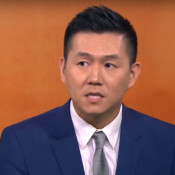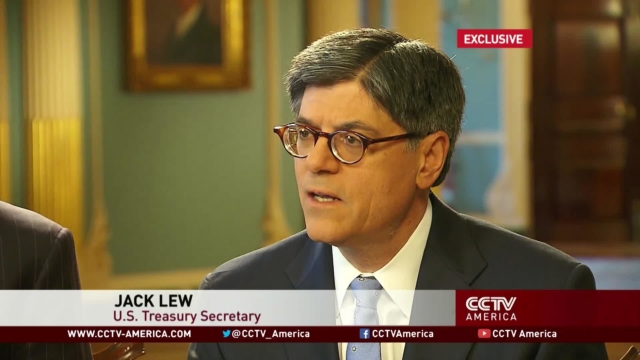Before Treasury Secretary Jack Lew landed in Beijing this week he spoke to CCTV’s Wang Guan about the China-U.S.relationship and what’s high on the U.S. agenda at the 2014 Strategic and Economic Dialogue.
“The issues that we’re dealing with are familiar and there are issues we need to make more progress on. From our perspective, having a level playing field where U.S. businesses can compete with Chinese businesses – both in the U.S.and China – is important. Our markets are very open; we welcome investment. We look forward to having opportunities for US businesses to participate and contribute to China’s economy,” said Lew.

Jack Lew on U.S. agenda for upcoming China-U.S. S&ED
Before Secretaries Kerry and Lew landed in Beijing this week, CCTV spoke to both of them about the China-U.S. relationship. Treasury Secretary Jack Lew spoke about what's high on the U.S. agenda.For the complete interview, click here.
Complete transcript of exclusive interview with Secretary of the Treasure Jack Lew.
Interview conducted by Correspondent Wang Guan in anticipation of the U.S.-China Strategic and Economic Dialogue in Beijing, China, July 9-10, 2014.
Any excerpts used should be credited to ‘CCTV America’ or ‘CCTV America, the U.S.production arm of China Central Television’
(Wang): “Right. And talking about economics, Secretary Lew I want to start with the US economy. The latest figure showed that the US economy shrank by 2.9% in the first quarter. First of all, your interpretation on this figure and your assessment on the state of the US economic recovery.”
(Lew): “I remain quite optimistic about the state of the US economy and the trajectory we’re on. We had a very cold winter this year…it drove down activity. We also had inventories built up at the end of last year and they naturally drew down at the beginning of this year, and there were some things going on that were actually quite anomalous at the beginning of the year. If you look at the data from March/April/May it all shows continuing growth consistent with what we were seeing at the end of last year. And, look, I think that’s important for the United States – I think it’s important for the world economy. China and the United States are the world’s two largest economies. We have special responsibilities, both in terms of our own economies and the global economy. And that’s why the discussions that we’re going to be having at the S&ED in a week are so important because we need to be able to work well together and to make sure that there is a US-China relationship that’s good for the global economy.”
(Wang): “Right. Talking about China’s economy-it’s also slowing down and reforms are underway, while the US is trying to sustain its economy. So given these new realities, what do you think that these new realities will mean for bilateral economic relationship?”
(Lew): “Look, I think China is undertaking an ambitious set of reforms through the leadership of President Xi and the third party plenum. It is a set of policies which, I think, are very important for China’s future economic growth, and we have been very much encouraging moving ahead with that. I know there’s been a lot of focus on the short-term economy. I have consistently been on the more optimistic side that China has tools to deal with the short term. I think the real challenge is making sure that China is on a path for the medium and long term to keep growing. It’s important for China, it’s important for the US economy, and the global economy.”
(Wang): And talking about the S&ED. What can we expect? What specific problems will this round of the dialogue solve, first of all, on the economic track?
(Lew): Well look, on the economic track we have had successful discussions over the last six years where we make progress step-by-step. The issues that we’re dealing with are familiar and there are issues we need to make more progress on. From our perspective, having a level playing field where US businesses can compete with Chinese businesses– both in the US and China – is important. Our markets are very open; we welcome investment. We look forward to having opportunities for US businesses to participate and contribute to China’s economy. The exchange rate – it’s an issue which has been a very significant one in our discussions. Since 2010 there has been progress but over the last year we have seen the exchange rate go down again. The first step would be transparency – if it was clear when the government was intervening and why – that would help quite a lot. China needs a market determined exchanged rate, it’s something the government has committed to in its own policy statements and it is an important part of our conversations. Last year we made progress in the S&ED on the bilateral trade agreement where China agreed to a negative list. We need to see more progress populating that list and starting to see how it can become the basis for further discussions.”
(Wang): “What does the Asia Pivot mean from an economic perspective, Secretary Lew?”
(Lew): “From an economic perspective, as Secretary Kerry was saying, the Trans-Pacific Partnership was designed to raise standards, to have a high quality agreement so that we could increase the growth and the economic activity in the whole region. That’s good for the United States, it’s good for China, and it’s good for the global economy. We started TPP as a way to say anyone who’s willing to live with high standards is welcome to be part of it. We want to drive the world to being open without barriers and to have fair, level playing field, which is good for all of our economies. It was misunderstood early on in China. As I’ve had conversations over the last year and a half, I think it’s better understood now. The questions are very different now than they were even 18 months ago. It is not something that was designed to keep China out or about China, it was designed to raise standards and we hope China can raise its standards in so many of the wayswe’re talking about. Great powers have responsibilities. As an economic great power, one of the two largest economies in the world, China in particular has a lot of responsibility, as do we.”
(Wang Guan): “So the US would welcome China’s participation?”
(Lew):”We have designed TPP as being opens for countries that have high standards that want to join. I think the challenge for China would be to meet the high standards and we think that’s a challenge that’s worthy of all the countries in the region of seeking.
(Wang): “Taking about regional economic development, obviously China-U.S. Investment relationship is very important. Secretary Lew, you mentioned the Bilateral Investment treaty, the negotiation over which re-started last year, when can we expect it to conclude? What are the challenges?”
(Lew): “These are always challenging agreements and I think it was an important first move that China last year said it would move to a negative list. We have not yet seen that list populated. We’ve also not seen exactly how Shanghai Free Trade Zone develops. I think there is work to be done there and we look forward to engaging with our Chinese counterparts. I don’t think bilateral investment treaties get negotiated in days and weeks so it’s not something that’s likely to be completed at this moment.
But we continue to make progress and continue to open markets. You know we pride ourselves that the United States, our markets, are among the most open in the world. From the beginning of our country, encouraging foreign direct investment has been one of the ways we’ve grown. I actually think it would be good for China to make progress in this area and good for the world economy. Certainly there are American companies that would be happy to do business in China if the level playing field can be provided. There are other issues of concern that’s outside the scope of the bilateral investment treaty. You talk to companies seeking to invest in China, the questions about intellectual property come up almost every time. So it’s part of a package of issues where to be one of the leading economies in the world, to be one of the leading nations in the world, you have to meet a certain set of standards. And we look forward to working with China as it meets those standards and we can strengthen our economic relationship. One of the things I will say is that in times where there are other issue that are challenging, we continue to make progress on economics issues. It’s important for both our countries and for the world economy. “
(Wang Guan): Thank you so much Secretary Lew and Secretary Kerry.
(Kerry): Thank you, good to be with you.
(Lew): Good to be with you.
###
END TRANSCRIPT FROM CCTV AMERICA
Any excerpts used should be credited to ‘CCTV America’ or ‘CCTV America, the US production arm of China Central Television’
For more information
 CGTN America
CGTN America

